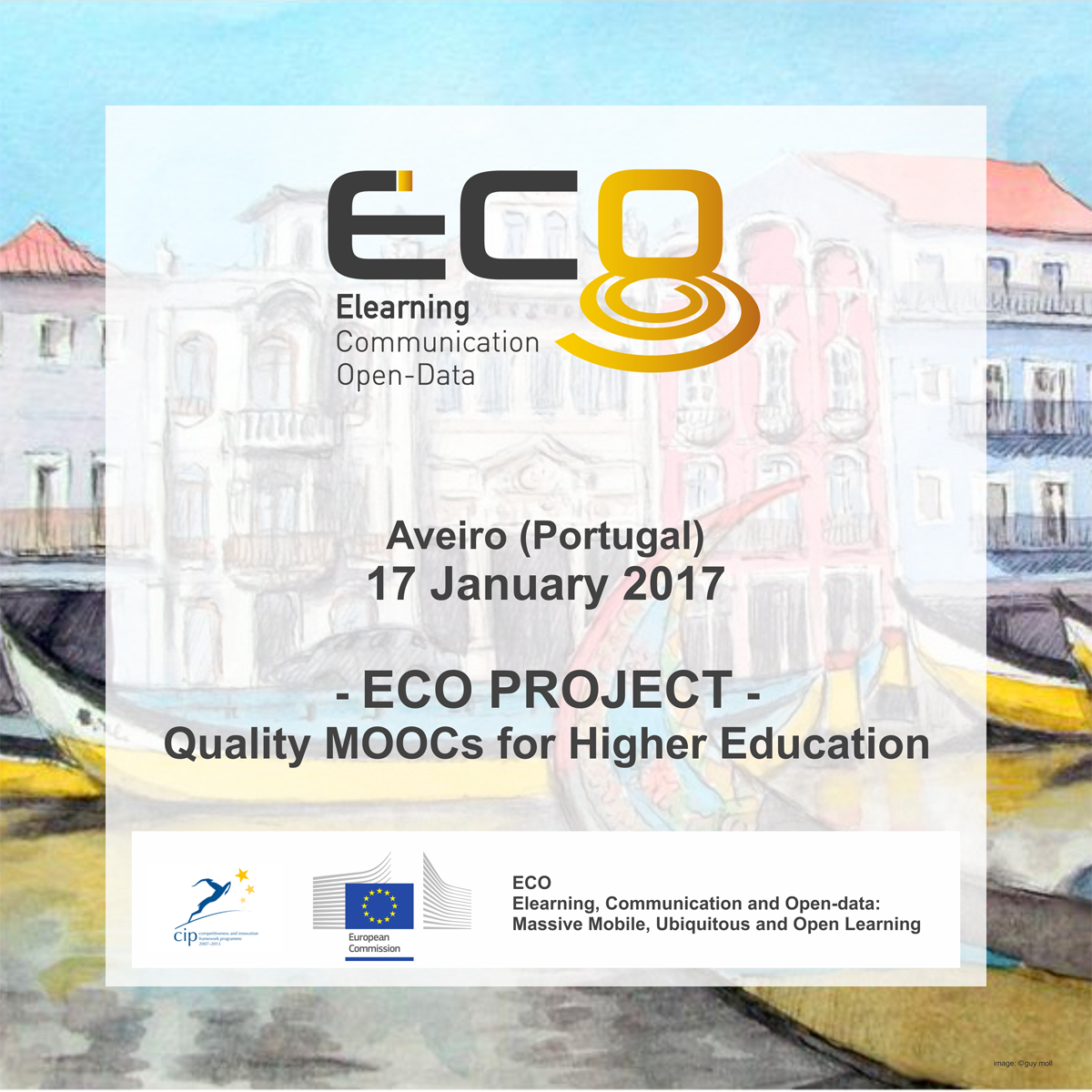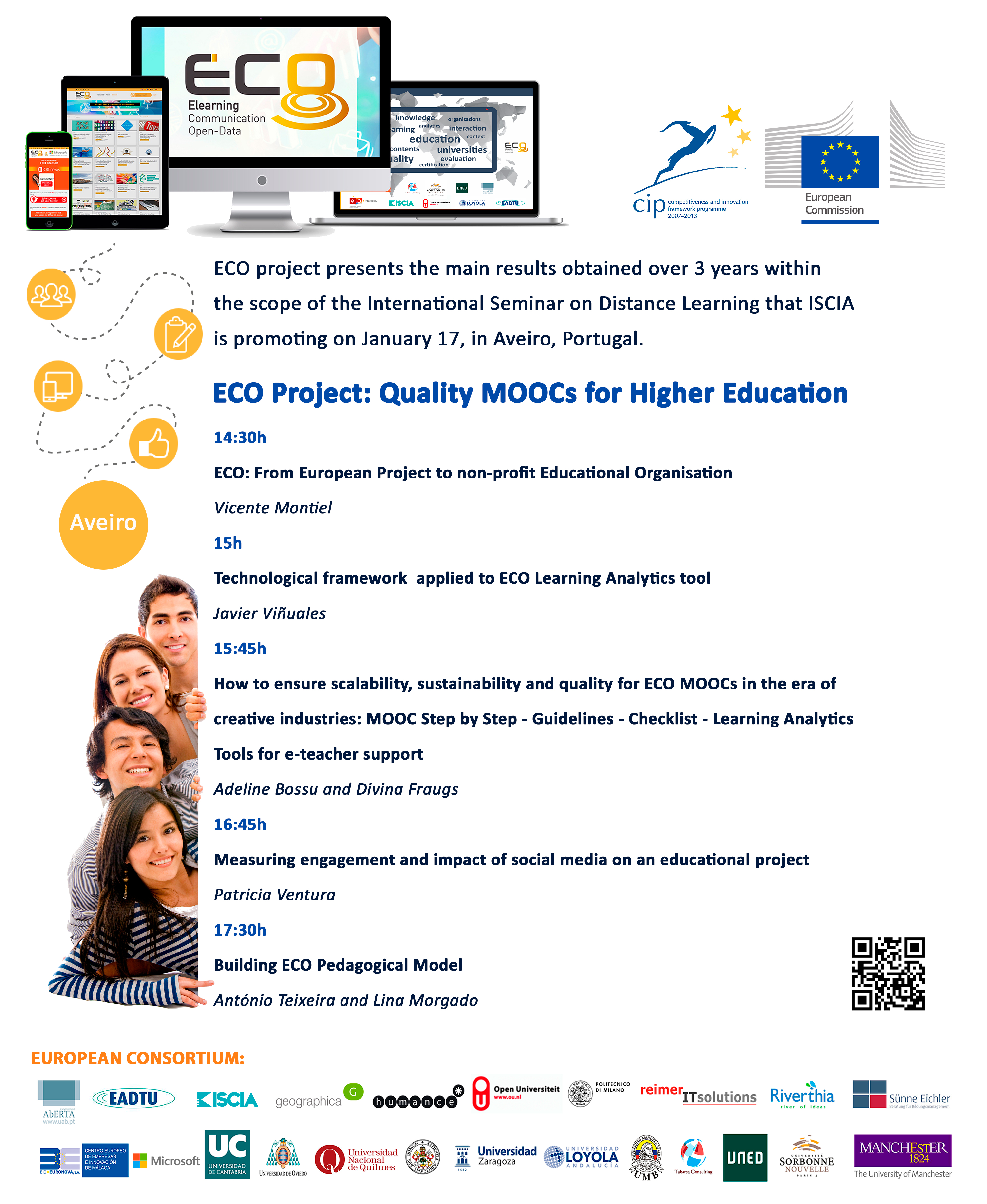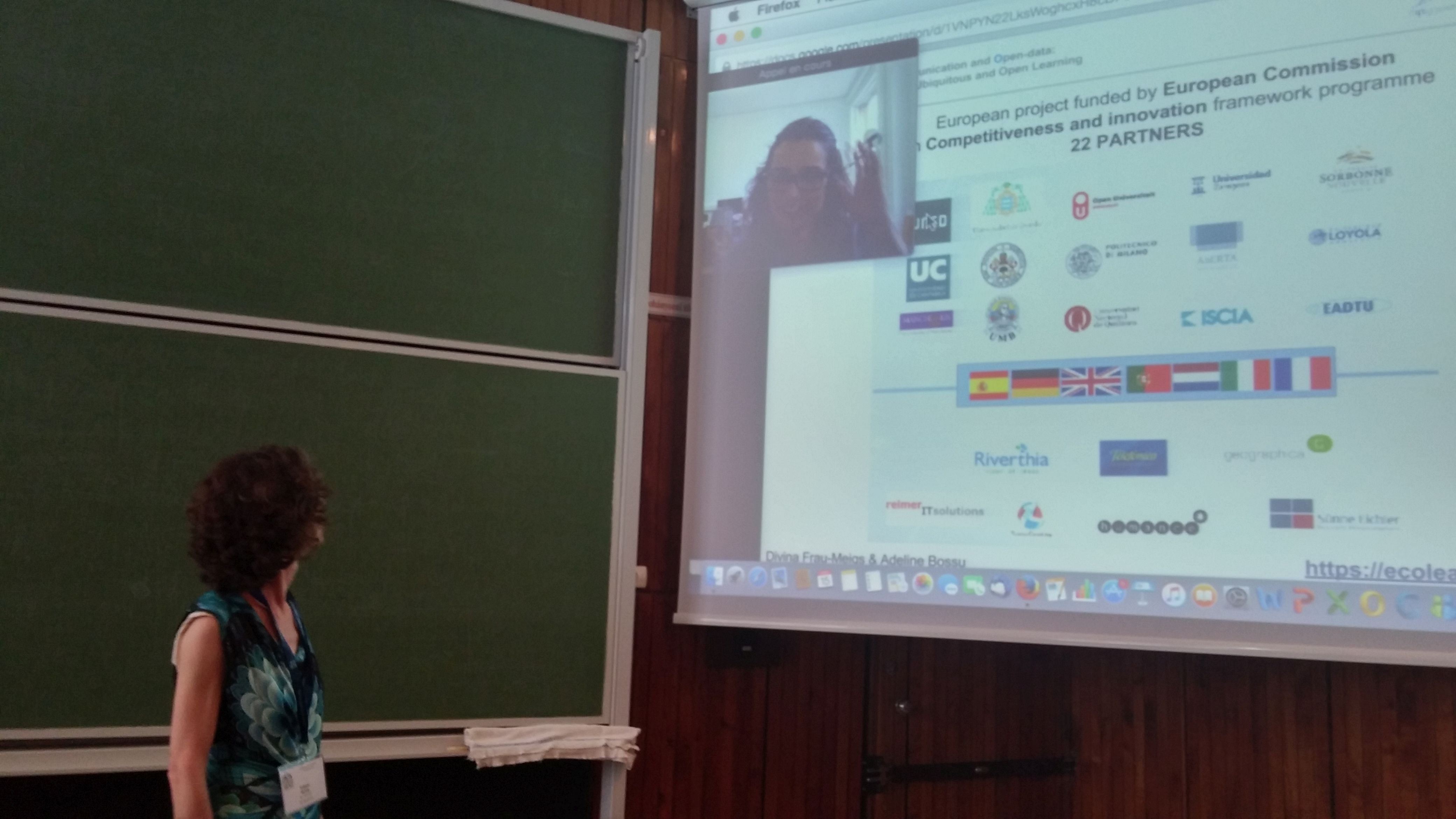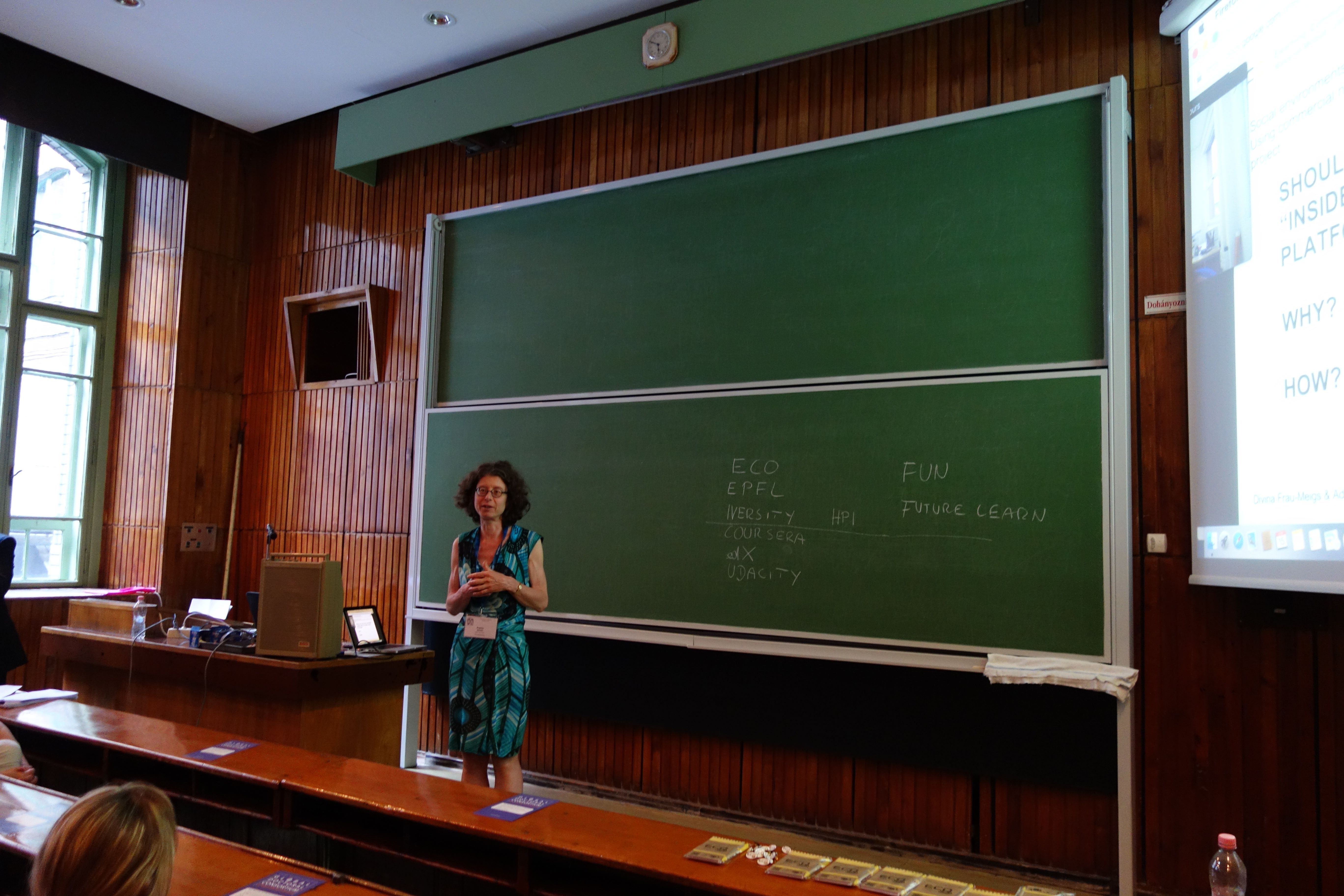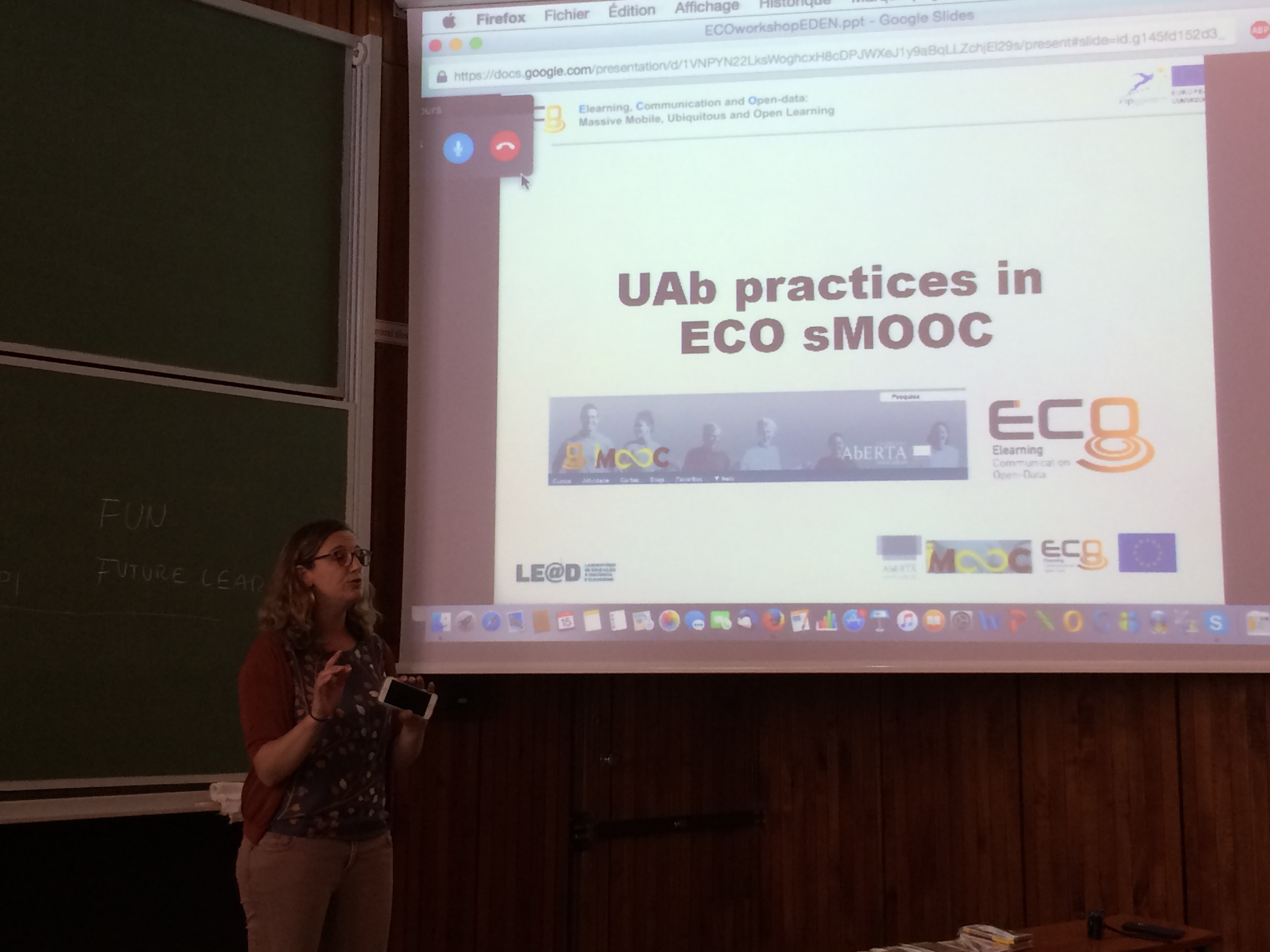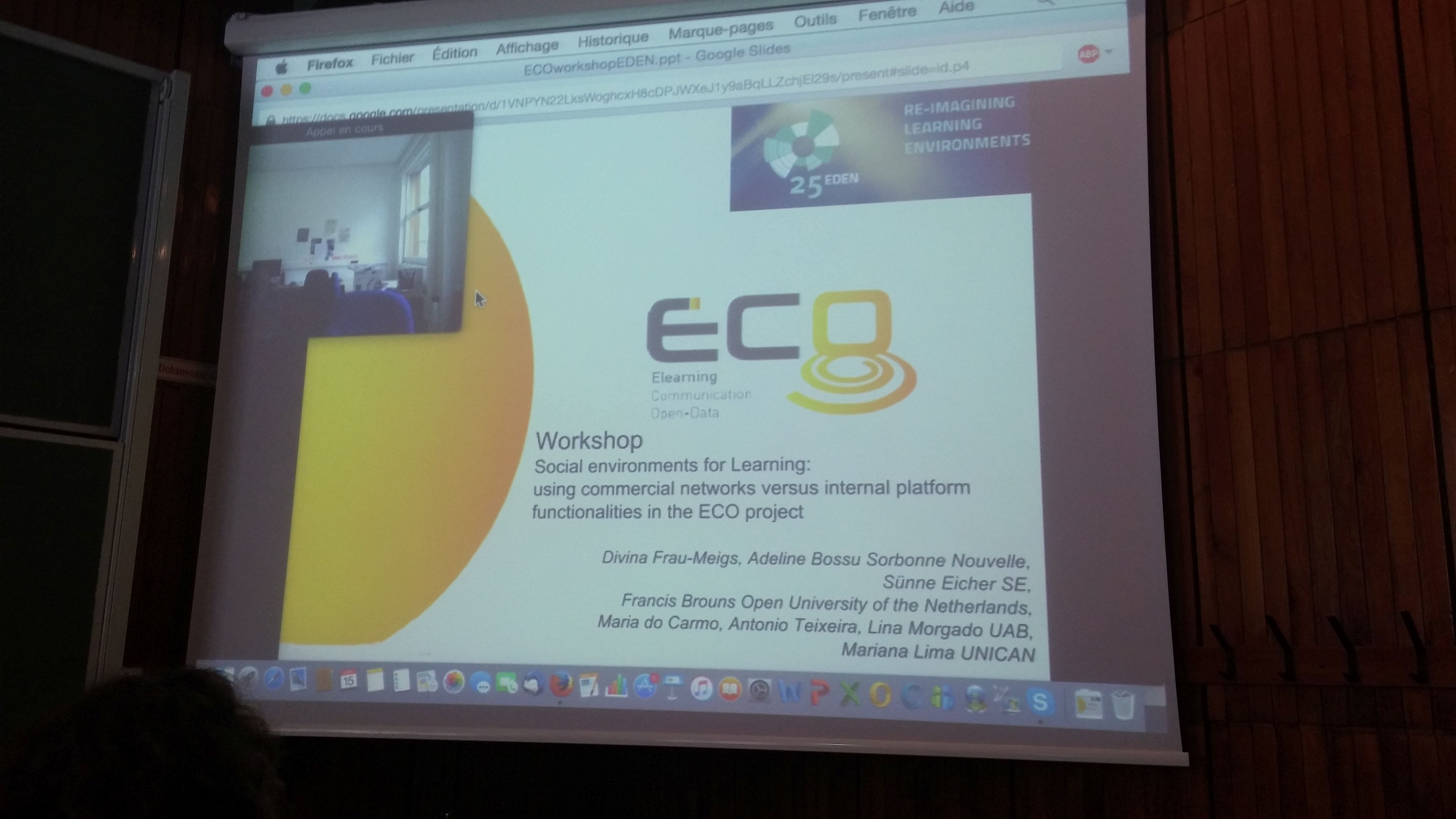Category Archives: Conferences MOOC
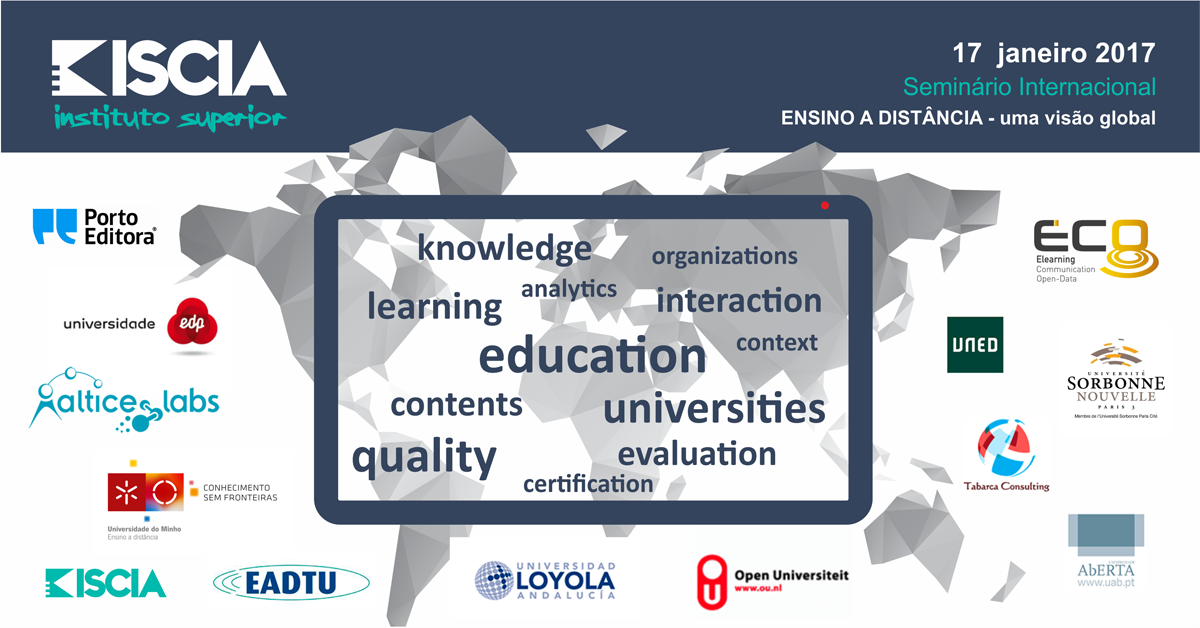
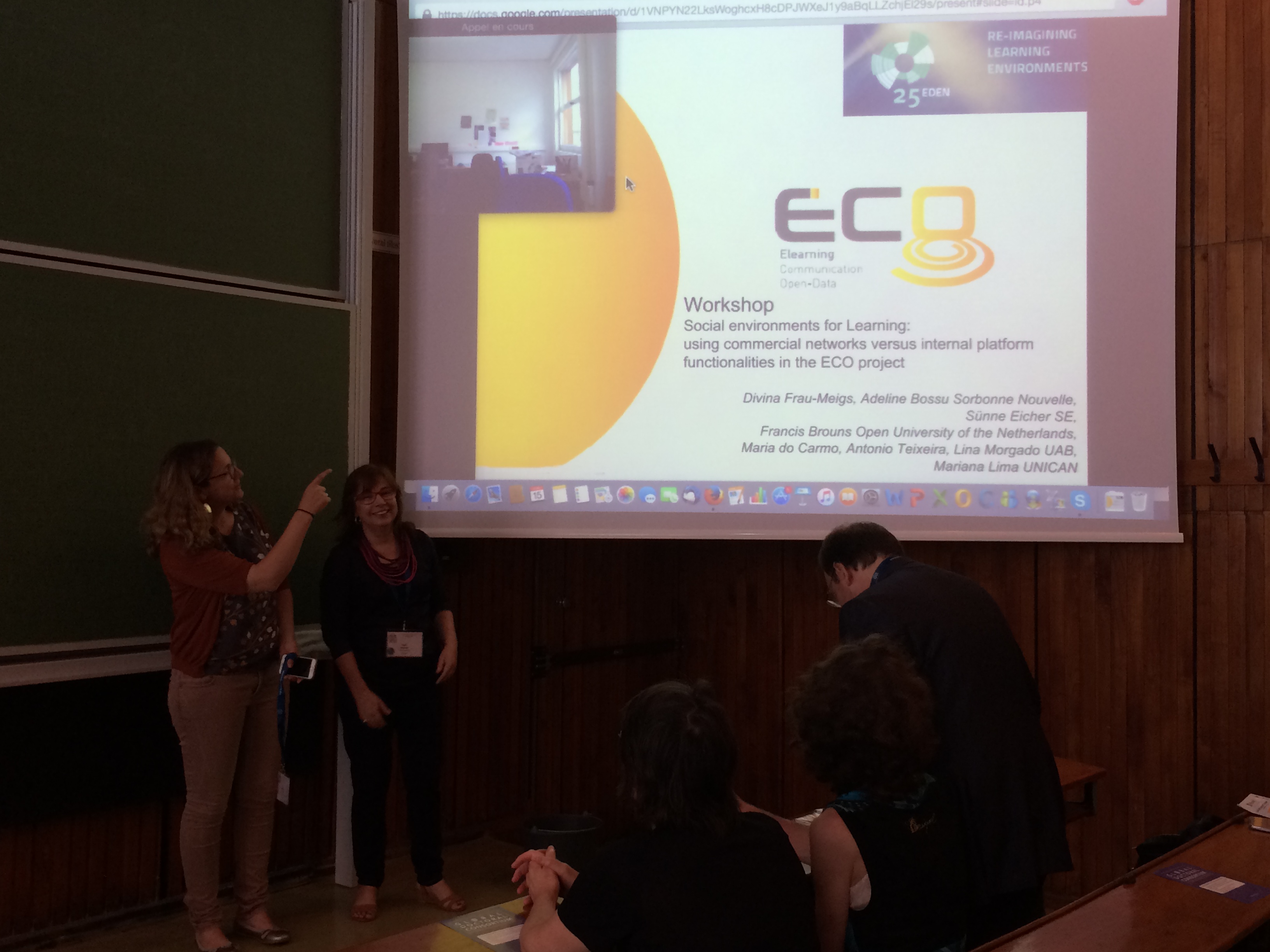
On the 15th of June, representatives of the ECO project organised a workshop on social learning at one of the most relevant MOOC conferences in Europe, the EDEN Conference in Budapest:
The ECO-workshop was entitled “Social environments for Learning: Using commercial networks versus internal platform functionalities in the ECO project.”
and was prepared and conducted by:
- Convenors: Divina Frau Meigs, Adeline Bossu, Sorbonne Nouvelle
- Moderator: Sünne Eicher, SE, ECO Project
Social Learning as an accelerator
MOOCs are an essential part of open education and highly effective tool for social inclusion. The very nature of the massive, open learning modules such as proposed by ECO and other MOOC providers creates a socially inclusive platform. In addition, the ECO MOOC designers created modules that derive their learning models based on peer reviews and learning by sharing knowledge. In this workshop, social learning within the ECO Project is being used actively in the global MOOC Step by Step, which teaches the participants and future eTeachers how to create their own MOOC module. Knowledge sharing between is an essential part of the social learning premise of this MOOC.
ECO Workshop Content at EDEN MOOC Conference
In this workshop ECO discussed the controversial use of commercial social networks within learning environments, where privacy and traceability, are an issue in proposing this format.
Understanding the dynamics of such participatory tools is crucial to social MOOCs. They are a vital part of the 34 ECO MOOCs.
Participants were invited to share, compare, and comment on their own practices and ideas. Questions that were asked the workshop participants:
- How to keep the potential of social networks while building learning and educational competences?
- What is the right balance between commercial and non-commercial uses in sMOOC pedagogical design?
- Are social networks valid tools that contribute to constructivist forms of knowledge?
- What new learning strategies can emerge from such network effects?…
The presented went on to comment on the democratic foundings of the ECO MOOC design and the importance of ubiquitous and social learning in this context.
The workshop was very well received and attended.
During the 6th International Conference Learning Analytics & Knowledge in Edinburgh (LAK16) researchers of the Welten Institute won the award for the best poster. Maren Scheffel was awarded the price for her poster on The Dutch xAPI Experience that was partly based on ECO’s learning analytics model developed in WP2 and implemented in WP3.
The online version of the poster is available here.
Image taken from LAK16 website
Author: Francis Brouns (Open Universiteit)
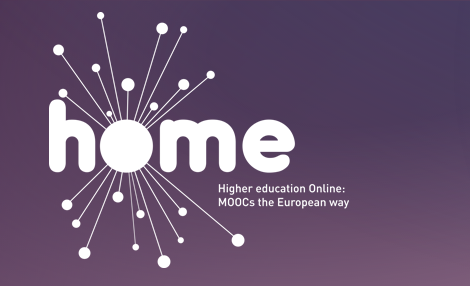
Tomorrow, 28th of June, our partner Universidad de Oviedo, represented by Santiago Fano, is taking part in the Policy Forum on European MOOCs, organized by EADTU and HOME (Brussels, Dutch House of Provinces). As stated on the project’s website: “The forum will contribute to better position decision makers to understand the “MOOC phenomenon” and capitalise on the advantages of these large-scale courses and use them as a strategic opportunity to help meet local needs and develop related capacities.”
Santi Fano will take part in the panel “Shared MOOC services: regional, European or global level?” along with other project’s representatives, such as the French MOOC service provider, FUN. His policy paper “MOOC Development Policies: The ECO Project in the European and Spanish Context” is available (p. 78) at the full publication “European Policy Response on MOOC opportunities“.
Image taken from http://home.eadtu.eu/news/109-policy-forum-on-european-moocs
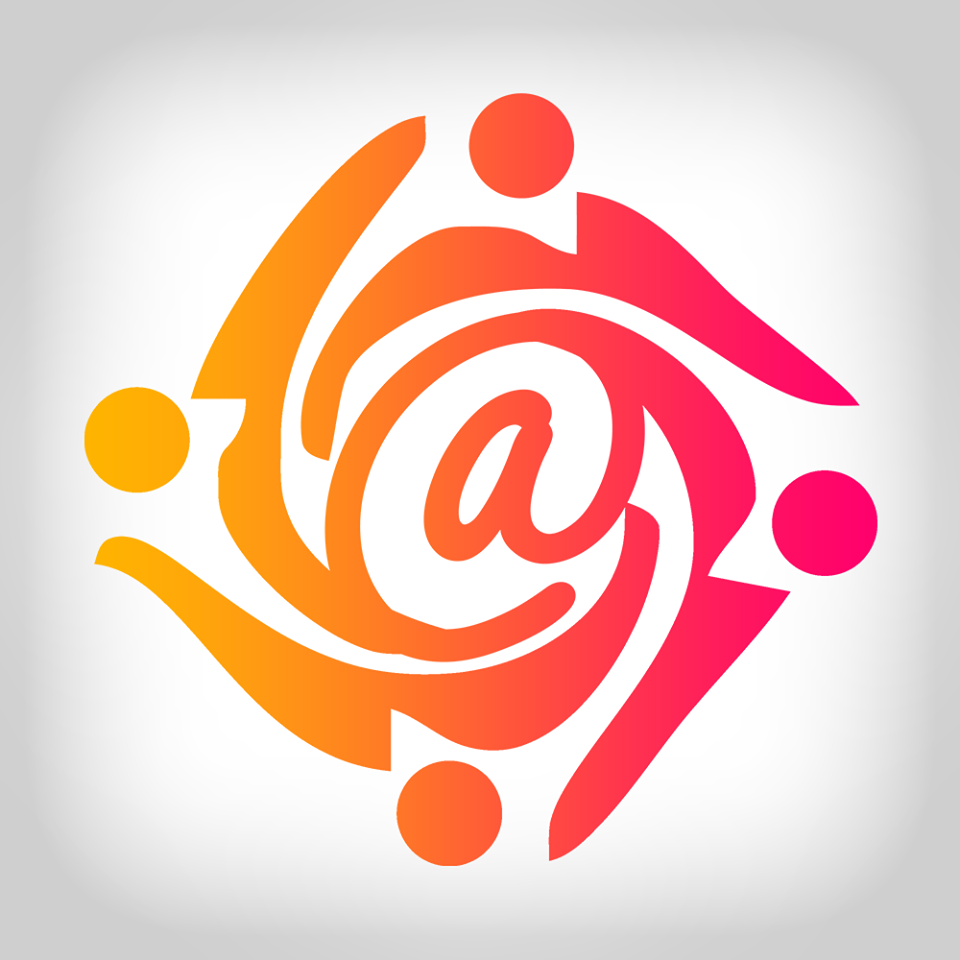
Innodoct is an International Conference about Innovation, Documentation and Teaching Technologies that has taken place in Valencia the days 18- 20 of May 2016. The aim of this conference is to provide a forum for teachers, researchers and professionals that allows sharing their investigations, actual projects, results and challenges and discussing ideas related with New Technologies of Information and Communication; it also will allows sharing innovations and methodologies applied to Education and to Investigation. In the context of this conference the eTIC team of the University of Oviedo has presented the communication “Teaching Innovation in the training about Digital Literacy for groups in risk of social exclusion” where the teaching roles of the MOOC “Digital Literacy for groups in risk of social exclusion” of the project ECO Learning is analysed, this shows the possibilities that social networks open for teaching innovation through the strengthening of the paper of teaching teams that develop massive online training, which finally is one of the challenges that are considered currently in this area.
This paper has gotten a double recognition in Innodoct: the award for the best paper and the award for the best video presentation. The awarded video sums up the most relevant aspects of the paper and shows the experience developed has teachers in the MOOC about Digital Literacy of groups in risk of social exclusion of the ECO Project.
Please, use YouTube’s self-winding translation to read the subtitles of the video in English.
Author: Isabel Hevia (Universidad de Oviedo)

Between the 14th and 17th of June the annual elEarning European Distance and eLearning Network (EDEN) Conference will take place in Budapest.
The context of the EDEN conference for 2016 is described (on the website) as follows: “The powerful combination of the ’information age’ and the consequent disruption caused by these unstable environments provides the impetus to look afresh and identify new models and approaches for education (e.g. OERs, MOOCs, PLEs, Learning Analytics etc.).”
Attend ECO workshop
It is therefore very suitable for ECO to attend this conference and connect with subject matter peers and experts.
ECO will be hosting a workshop “Social environments for Learning” on Wednesday 15th of June, during the afternoon parallel sessions: C7 from 16:15h until 17:45h.
- Convenors: Divina Frau Meigs, Adeline Bossu, Sorbonne Nouvelle, ECO project
- Moderator: Sünne Eicher, SE, ECO Project
In this workshop we propose to discuss the pros and cons of using commercial social networks vs internal contained social network functionalities within a MOOC platform. The use of commercial social networks is relatively controversial for learning environments, beyond issues of privacy and traceability, especially in Europe.
Researchers have found tensions and polarizations that complicate the issue: open vs contained content, formal vs informal settings, structured vs unstructured exchanges, traceable vs untraceable data, personal vs professional status of interactions.
Why attend?
Understanding the dynamics of such participatory tools is crucial to social MOOCs. They are part of the live core of interactive spaces characteristic of sMOOCs and contribute to transforming the relation to learning, if not to the nature of knowledge itself. They enable flux and openness while facilitating communication among various types of participants (teachers, mentors, tutors, learners….). They create an epistemic community with an important impact on the learning events as they are delivered within the spaces of interaction provided by the social networks. This “inside-outside” navigation creates synergies and empowers communities as they can mix and remix the resources available online and produce their own projects and evaluations.
The workshop will examine different ways of using social networks functionalities “inside-outside” a sMOOC platform, based on practices carried out by the sMOOC pilots of the European project ECO and their evolution through several iterations. We will also present how ECO pedagogical teams use commercial and non-commercial social networks in order to reach the goals of the European project (enrolment, motivation, community management, e-teacher projects…). We will also consider some limitations and constraints that may arise, such as the efficiency and/or redundancy of using several social networks. We will also reflect on the logics adopted by various actors as the limits between social conversations and pedagogical conversations get blurred, in spaces that remain partly dominated by the heritage academic framework.
Participants are invited to share, compare, and comment on their own practices and ideas. They are invited to join the conversation around such questions as: how to keep the potential of social networks while building learning and educational competences?
What is the right balance between commercial and non-commercial uses in sMOOC pedagogical design? Are social networks valid tools that contribute to constructivist forms of knowledge? What new learning strategies can emerge from such network effects..?
The full conference programme can be downloaded here.
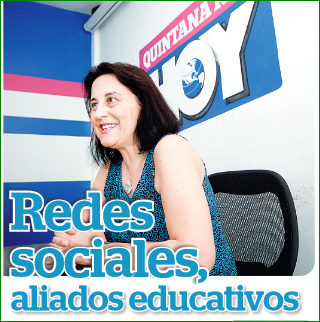

Fuente: Periódico Quintana Roo Hoy
The ECO project is presenting and represented in various MOOC and educational conferences, not just in Europe but throughout the world.
ECO project coordinator Sara Osuna travelled to the CIP conference in May in Cancún 2016 to present the status on the 17 ECO Learning MOOCs as well as the progress made on the first MOOCs designed and run by the programmes own eTeachers. ECO learning is on a path of growth towards an expending democratic form of education, where both learning and teaching anytime, anywhere needs to be top of mind.
“The idea is to drive the enrichment of ubiquitous learning and pull down the classroom walls in education, proving that people are capable of learning anywhere”, Sara Osuna says in an interview with Quinta Roo Hoy, a media platform covering the CIP Conference, II Cumbre Iberamericano de Periodismo, which took place between 12 and 15th of May in Cancún, Mexico. Theme of the conference was Channels, journalism and development, the power of internet in Latin America (Medios, periodismo y desarrollo, el poder de internet en América Latina).
Osuna commented during the interview and at the conference on the results ECO Learning project so far: 17 MOOC courses, 100% free, the ECO course portfolio encompassing content from humanities topics to languages, robotics and creativity, in no less than 6 different languages. 50.000 Registered participants so far.
The interview can be read here in Spanish.
In addition she expressed her content with not only these numbers and facts, but moreover the proof that through these Massive Online Open Coomunication modules, education can be accessed and enjoyed by anyone, regardless of the time or place. Anyone interested needs just an email address and internet connection, register and choose the or more courses as they like, free of charge. In that sense the MOOC portfolio is giving everyone the opportunity to develop, learn, close any skills gap they feel they to close for better job opportunity or for the purpose of personal growth.
In other words: we are getting one step closer to eductional democracy.
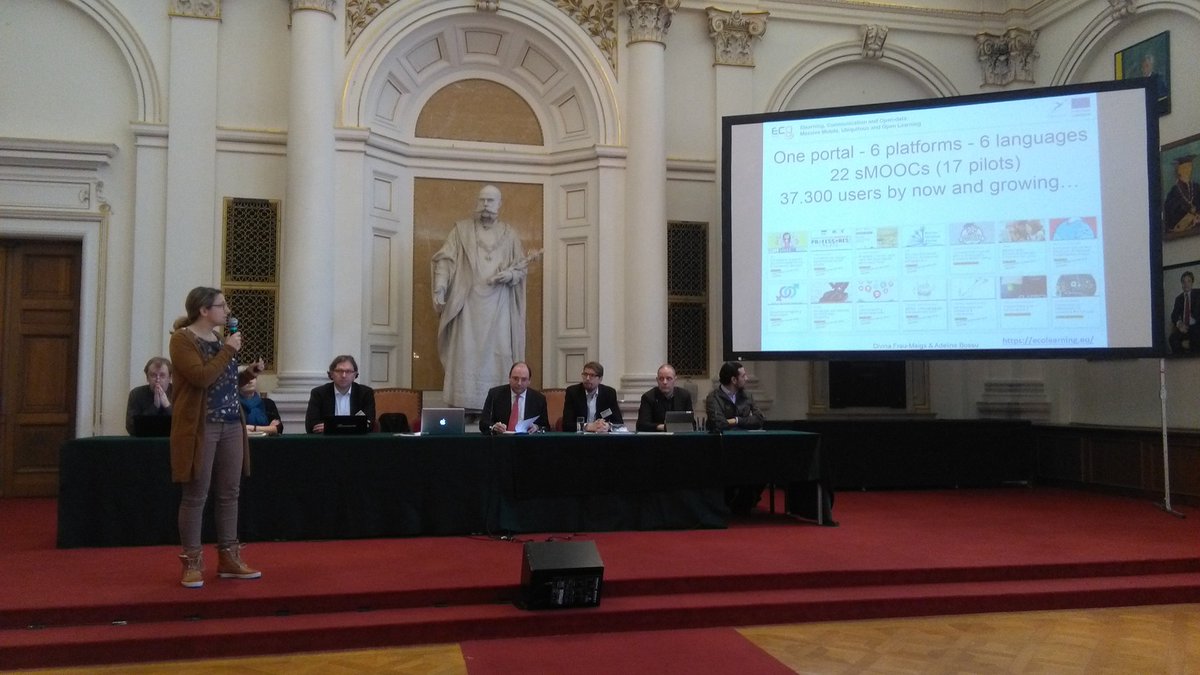
18.02.16 – ECO Project is deploying a team of 10 experts to the upcoming edition of eMOOCs 2016, for a pre-conference event. Designed as a multidisciplinary workshop and in the hope to encourage collaborative learning and active participation for all those attending, the event is announced as a “Masterclass” under the title: Intercreativity and Interculturality in designing MOOCs and in applying business models.
eMOOCs2016, is the European MOOCs Stakeholders Summit, organized by the University of Graz and Graz University of Technology, in Austria. The conference will include three tracks: Institutional & Corporate, Experience, Research and a Pre-Conference MOOC
As for ECO’s Masterclass, it will consist of two parts related to the design of sMOOCs and to sustainable business models for MOOCs. The first part will actively guide you through the activities in creating a sMOOC. sMOOCs (seamless/social MOOCs) are based on constructivist and connectivist pedagogical theories which foster intercreativity and interculturality. The basic principles of these concepts will be introduced and translated to design guidelines of MOOCs. Next, the pedagogical model will be discussed and illustrated with several examples. The implementation process of the sMOOC model in the ECO project will be described by two local partners, based in Germany and Italy. In addition, discussion will spin around ECO Project’s sMOOC “step by step” (6 languages, several European partners). This transversal course acted as a regulator of quality because it was designed calling on all the teams and their best practices. It also augmented interculturality and intercreativity across institutions and countries.
The second part will introduce the participants to the different business models for MOOCS as developed by ECO partners. The audience will be guided through different business models at different (stakeholders) levels, starting by business models at the MOOC level using principles of the freemium model. Next, business scenarios at the institutional level will be discussed, in close related with business providers. Lastly different governmental business models will be illustrated.
Experts:
Chair: Darco Jansen, EADTU, The Netherlands
- Divina Frau-Meigs and Adeline Bossu, U Paris 3-Sorbonne, France
Sara Tejera, UNED, Spain.
António Teixeira, António Moreira Teixeira, U Aberta, Portugal
Alessandra Tomasini, Polimi, Italy
Sünne Eichler, Sünne Eichler Beratung für Bildungsmanagement, Germany
Vicente Montiel, TABARCA, Spain
Details: Monday, 22.02.2016, 09:30-12:00, Room. Nr. HS 01.13
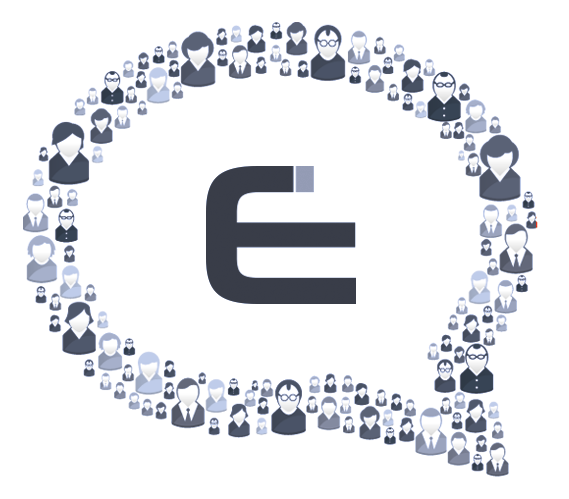
What are MOOCs? What is happening in the world of digital online education? Which online courses are good for me? Why should consider designing my own MOOC?
What is the MOOC development?
The developments in the field of Massive Open, online Courses (MOOCs) are moving very rapidly and the options these format offers teachers are very relevant. MOOCs by their sheer online and open nature, are accesible anywhere and by anyone. For you as a teachers they offer the opportunity to teach participants far beyond the classroom and reaching out to participants that would otherwise never be able to enjoy neither the contents of the material, nor your methodology.
Breaking barriers
MOOCs allow you to break the barrier of time, place, age, gender and social class. Educators and managers in the field of e-learning all over the world are extensively discussing the framdwork for the full potential of MOOC-teaching to grow into a reality. If you would like understand what the MOOC-movement iss about, how it can positevely impact your teaching career or be actively part of it, attend one of the MOOC conferences or ask your management board to represent your teaching institute.
MOOC Conference Agenda 2015
| 15-18 September | Toldeo, ES | ECTEL, tenth European Conference on technology enhanced learning,Design for Teaching and Learning in a networked World. | www.ec-tel.eu |
| 14-16 October | Sun City, SA | ICDE; Growing capacities for sustainable distance e-learningprovision. | www.unisa.ac.za/icde2015/ |
| 29-30 October | Hagen,DE | EADTU, Technology-based teaching and learning lead to the transformation of higher education. | conference.eadtu.eu/ |
| 19-21 November | London, UK | EQAF, 10th European Quality Assurance Forum Taking stock and looking forward. |
www.eua.be/events/upcoming/EQAF-2015 |
| 2-4 December | Berlin, DE | Oeb, shaping the future of Learning. | www.online-educa.com/ |
